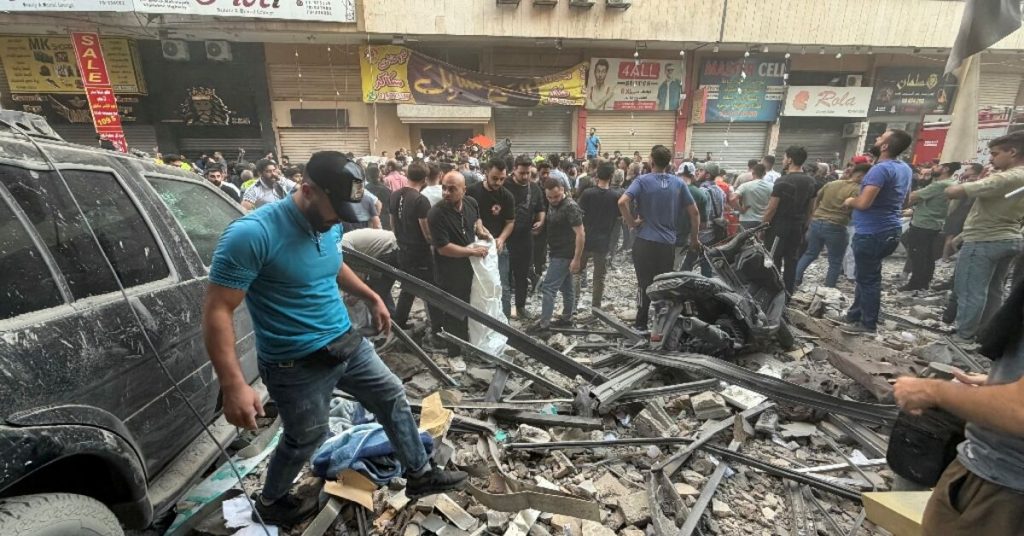The recent escalation in tensions between Israel and Hezbollah reached a critical point on Sunday with the confirmed killing of Haytham Ali Tabatabai, Hezbollah’s chief of general staff, in an Israeli strike on Beirut. This event marks a significant development in the ongoing conflict, raising concerns about a further widening of hostilities. This article will delve into the details of the strike, the reactions from both sides, and the potential implications for the region, focusing on the impact of this Hezbollah commander’s death.
Israel Strikes Beirut, Killing Senior Hezbollah Leader
The Israeli military announced the elimination of Haytham Ali Tabatabai, describing him as a key terrorist figure within Hezbollah. The strike targeted an apartment building in the Haret Hreik area of Beirut’s southern suburbs, a district known as a stronghold for the militant group. Lebanese authorities reported that five people were killed and 28 others injured in the attack. While the health ministry initially did not release the identities of the victims, Hezbollah later confirmed that four of its fighters were among the deceased, including Tabatabai.
The attack involved three missiles, according to the National News Agency of Lebanon, causing substantial damage to the targeted building. Rescue workers were immediately dispatched to the scene, working through the debris to find survivors, while Lebanese soldiers secured the area. Witnesses recounted a scene of chaos and destruction, with reports of burned-out cars and a body being evacuated wrapped in a white bag.
Netanyahu Vows to Prevent Hezbollah Rearmament
Israeli Prime Minister Benjamin Netanyahu responded to the strike with a firm statement, asserting that Israel “will not allow Hezbollah to rebuild its power.” He called on the Lebanese government to live up to its purported obligations in disarming Hezbollah, highlighting a long-standing Israeli demand and a central point of contention in the region. His office stated that Tabatabai was instrumental in leading Hezbollah’s efforts to rearm and expand its capabilities.
Defense Minister Israel Katz amplified this message with a stark warning: “Anyone who raises a hand against Israel will have his hand cut off.” Katz emphasized that Israel will continue its “policy of maximum enforcement,” indicating a willingness to utilize force to counter perceived threats from Hezbollah. This aggressive stance underscores Israel’s determination to maintain its security posture in the face of the continuing instability.
The Significance of Haytham Ali Tabatabai
The killing of Haytham Ali Tabatabai represents the most significant loss for Hezbollah since the cessation of hostilities in November 2024. While not a widely known figure publicly, Tabatabai held considerable influence within the organization. Sources close to Hezbollah reveal that prior to his appointment as military chief, he was responsible for the “Yemen file”, suggesting his role in coordinating support for the Houthis.
Furthermore, US intelligence reports indicate that Tabatabai commanded special forces both in Lebanon and in Syria, where Hezbollah has actively supported the Assad regime during the Syrian civil war. The United States had even offered a $5 million reward for information leading to his apprehension, demonstrating his high-priority status as a target. Therefore, the Hezbollah commander’s death is a considerable blow to the group’s operational capacity.
Regional Implications and International Response
This strike occurs just a week before the scheduled visit of Pope Leo XIV to Lebanon, a visit intended to bolster peace efforts and demonstrate solidarity with the Lebanese people. The timing of the attack casts a shadow over the papal visit and underscores the fragility of the current situation.
Lebanon’s President Joseph Aoun immediately condemned the Israeli strike and called for firm international intervention to halt further attacks on Lebanese territory and its citizens. He reiterated Lebanon’s call for the international community to take a resolute stance and actively work towards de-escalation and a lasting resolution to the conflict. The attack also raises concerns about potential retaliation from Hezbollah, potentially escalating the conflict further. The recent destabilization is a concern for Lebanon’s political stability.
Continued Ceasefire Commitment & ‘Maximum Enforcement’
Despite the aggressive action, the Israeli military maintains its commitment to the ceasefire agreement reached in November 2024. However, the continued strikes, particularly this recent targeting of a high-ranking Hezbollah official, demonstrate Israel’s interpretation of the ceasefire as allowing for measures to prevent Hezbollah’s rearmament.
This divergence in understanding – the Lebanese and international view emphasizing a full cessation of hostilities versus the Israeli perspective allowing for preemptive actions – is a key driver of the escalating tensions. The concept of “maximum enforcement” signals a willingness to challenge the status quo even within the framework of the existing ceasefire. This creates a dangerous dynamic that hinges on calculating and controlling the level of retaliation. The threat to regional security is growing with each escalation.
In conclusion, the killing of Haytham Ali Tabatabai is a pivotal event that significantly heightens the already-tense relationship between Israel and Hezbollah. While Israel frames the attack as necessary to prevent future threats, Lebanon and international observers are alarmed by the breach of sovereignty and the potential for further escalation. The future stability of the region, especially in light of the approaching papal visit, depends on a concerted effort to de-escalate the situation and address the underlying issues that fuel this ongoing conflict. Continued dialogue and pressure on both sides are crucial to avoid a full-blown war and safeguard the well-being of the Lebanese people.
